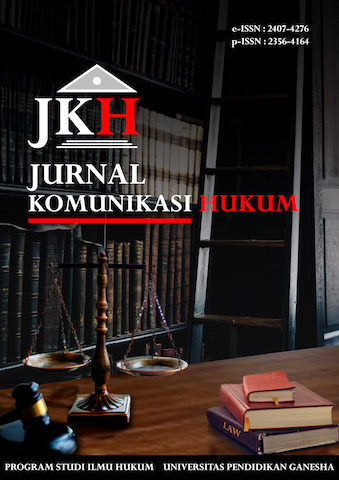IMPLEMENTASI PASAL 184 KUHP TERHADAP PENANGANAN TINDAK PIDANA PENGANIAYAAN YANG SULIT DITEMUKAN BARANG BUKTI (STUDI KASUS DI KEPOLISIAN RESORT MERAUKE)
DOI:
https://doi.org/10.23887/jkh.v8i2.51744Abstract
The main purpose of this research is to find out the implementation of Article 184 of the Criminal Procedure Code on the handling of criminal acts of persecution and the obstacles faced by the Merauke Resort Police in dealing with criminal acts of persecution that are difficult to find evidence of, while the method used in this research is empirical juridical. From the results of the research conducted by the author that the implementation of evidence in the investigation of criminal acts of persecution can be said to be valid to be transferred to the court if there are at least two valid pieces of evidence in accordance with Article 183 and Article 184 of the Criminal Procedure Code. If the existing evidence does not reach two valid pieces of evidence, then the evidence does not have sufficient evidentiary power at trial to prove the truth of the arguments or events or statements put forward. The obstacle for the Merauke Resort Police in dealing with criminal acts of persecution is that it is difficult to find evidence, namely from internal causes and external causes. It is necessary to make additional regulations regarding evidence to be used as a basis in handling or deciding criminal cases, especially regarding the crime of persecution. It is necessary to increase human resources such as the number of personnel and facilities and infrastructure such as rooms or houses for storing state confiscated objects for securing evidence of criminal acts as well as the Merauke Resort Police must firmly provide more explanations to witnesses and suspects the importance of evidence for the criminal investigation process persecution.
Downloads
Published
How to Cite
Issue
Section
License
Authors who publish with this journal agree to the following terms:- Authors retain copyright and grant the journal right of first publication with the work simultaneously licensed under a Creative Commons Attribution License that allows others to share the work with an acknowledgement of the work's authorship and initial publication in this journal.
- Authors are able to enter into separate, additional contractual arrangements for the non-exclusive distribution of the journal's published version of the work (e.g., post it to an institutional repository or publish it in a book), with an acknowledgement of its initial publication in this journal.
- Authors are permitted and encouraged to post their work online (e.g., in institutional repositories or on their website) prior to and during the submission process, as it can lead to productive exchanges, as well as earlier and greater citation of published work (See The Effect of Open Access).
Authors who publish with this journal agree to the following terms:
- Authors retain copyright and grant the journal right of first publication, with the work [SPECIFY PERIOD OF TIME] after publication simultaneously licensed under aCreative Commons Attribution License that allows others to share the work with an acknowledgement of the work's authorship and initial publication in this journal.
- Authors are able to enter into separate, additional contractual arrangements for the non-exclusive distribution of the journal's published version of the work (e.g., post it to an institutional repository or publish it in a book), with an acknowledgement of its initial publication in this journal.
- Authors are permitted and encouraged to post their work online (e.g., in institutional repositories or on their website) prior to and during the submission process, as it can lead to productive exchanges, as well as earlier and greater citation of published work (See The Effect of Open Access).












